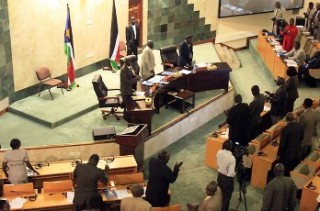South Sudan parliament amends constitution but delays more states
November 19, 2015 (JUBA) – South Sudanese parliament has amended the current transitional constitution, 2011, giving president Salva Kiir powers to create more states, appoint governors but delay the order establishing 28 states.

The amendment aims to relax the number of states per the constitution as well as allow the president to appoint governors.
Article 162 (1) which fixed the number of states to ten was amended so that “the President may for the purpose of efficient discharge of functions of the government, divide the territory of the Republic of South Sudan into states and other areas in accordance with procedures prescribed by law or provisions of such law as may be enacted by the concerned House of Legislature.”
This is a back-off from the amendment bill tabled in parliament by justice minister last month that sought to insert 28 states instead of ten in the constitution.
Article 164 (1) which defined the current states legislative assemblies, the manner of their composition, was amended to add that other members will be appointed by the president during interim period.
Article 165 which said governors will be elected is amended to say that “may be nominated by the president” in consultations with residents of each state during the interim period.
The creation of more states is now left for members of the council of states, which may decide how many states should be created.
The opposition faction (SPLM-IO) led by former vice president, Riek Machar, said both the order by the president to unilaterally create 28 states and the action by the legislator to endorse them are violations of the peace agreement signed in August by the warring parties on the basis of the current 10 states.
They argued that the future national legislature for transitional government of national unity which membership will include members of the opposition factions will be the body to amend the constitution in accordance with the peace deal.
TRIM PRESIDENTIAL POWERS
The African Union Commission of Inquiry on South Sudan, in its recently released report, said the Transitional Constitution of South Sudan gives the presidency too much power amidst weak institutions and a gap between the judiciary, legislature and the executive. As such, the 318-page report observed, the president’s power to remove some state officials, often without proper controls, was one causes of the instability.
“The Commission recommends that the future Constitution should establish a well-balanced system of separation of powers with adequate checks and balances,” it said.
This, the report noted, should be achieved through empowering and strengthening the capacity of the legislatures at both levels of government; subjecting major executive appointments to legislative approval; strengthening the judiciary (ensuring structural and financial independence from the political branches) and adherence to separation of powers, cultivating a culture of respect for judicial independence and rule of law.
The commission of inquiry has, however, recommended that the appointment and removal of the country’s vice president be subjected to the approval of the legislature.
(ST)
